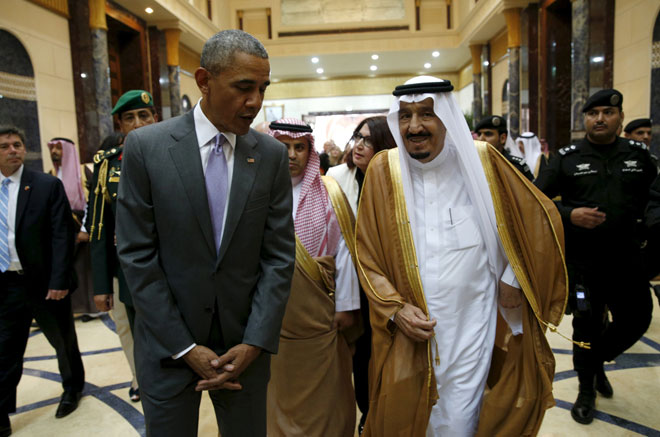
Obama walks with King Salman at Erga Palace upon arriving for a summit meeting in Riyadh, Saudi Arabia. — Reuters photo
RIYADH: US President Barack Obama met Gulf leaders in Saudi Arabia yesterday to push for an intensified campaign against the Islamic State group, despite strains in ties with Washington.
Making what is likely his final presidential visit to America’s historic allies, Obama posed for a summit photo with the six regional leaders, including Saudi King Salman, before beginning about four hours of talks at a royal palace.
With nine months left of his term, the president is also again seeking to reassure his Sunni allies upset over American overtures to their regional rival, Shiite Iran. The summit comes after Washington reported progress in recent months against the Sunni extremists of IS, who seized large parts of Iraq and Syria. Saudi Arabia and other Gulf states are part of the US-led coalition which has been carrying out air strikes against IS.
In a bid to keep up the momentum against the jihadists, Defence Secretary Ashton Carter – in Riyadh with Obama – announced on Monday that the US will send more troops and Apache attack helicopters to Iraq.
Washington also wants to emphasise the reconstruction of cities taken back from IS.
On Wednesday, Carter pleaded for greater Gulf financial and political involvement in Iraq, which is battling an economic crisis as well as the extremists. Carter made the comments after meeting his Gulf Cooperation Council counterparts.
“I encourage our GCC partners to do more, not only militarily as the Saudis, as the UAE have been doing… but also politically and economically,” Carter said. Sunni support for ‘multisectarian governance and reconstruction’ in Shiite-majority Iraq will be critical to ensuring the defeat of IS, the Pentagon chief said.
On the eve of the summit, US Secretary of State John Kerry was also in Riyadh, where he held talks with Deputy Crown Prince and Defence Minister Mohammed bin Salman.
Bahrain’s King Hamad said in a statement that the summit “clearly reflects outstanding relations between the GCC countries and US.”
He hoped the talks “would come up with results that would help handle the grave regional and international challenges, (and) boost regional peace and security.
But Gulf leaders are offended by Obama’s perceived reluctance to get involved in the region’s problems, and in particular his tilt towards their arch rival Iran.
They worry that Iran will be emboldened to seek a still bigger role in the region after the lifting of international sanctions in January under a landmark nuclear deal with major powers led by the United States.
Prince Turki al-Faisal, the kingdom’s former intelligence chief, told CNN that Obama’s conduct and declarations have made Saudi Arabia realise that the relationship has changed.
“My personal view is that America has changed, you know, as much as we have changed here. How far we can go with our dependence on America? How much can we rely on steadfastness from American leadership? What is it that makes for our joint benefits to come together? These are things that we have to recalibrate,” he said. — AFP
